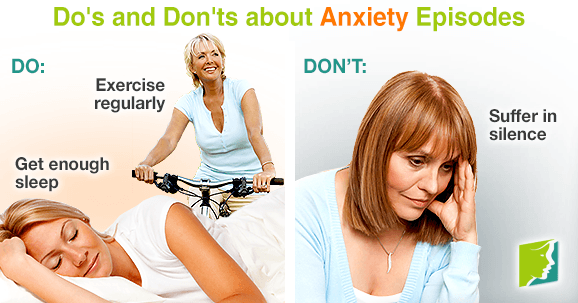Anxiety is a feeling of worry or dread – a natural human response to a scary or unfamiliar event. In most people, the feeling abates soon after the threat has disappeared. For some, however, they can experience a chronic sense of anxiety, at which manifests into a clinical condition. This condition can sometimes even lead to anxiety episodes, also called attacks, which can be frightening for the sufferer. Keep reading for more information about anxiety episodes and the do's and don'ts of dealing with them:
What Are Anxiety Episodes?
An anxiety attack is when a person feels an unexpected sense of intense panic, with symptoms often mimicking a heart attack or a breathing disorder. These symptoms include a rapid heartbeat, chest pains, the need to escape, and an overwhelming sense of impending disaster. The triggers for anxiety episodes are different for each person, but common triggers are small spaces, social situations, and heights.
Anxiety and its accompanying episodes can be caused by a variety of psychological, biological, and environmental factors, including traumatic events, family history, and unhealthy diets. Although it often feels like anxiety episodes are inevitable or uncontrollable, there are certain measures that can be taken to reduce their frequency or intensity:
Do:
Exercise regularly
It is generally recommended to do at least 150 minutes of exercise every week. Exercise encourages the release of the natural mood-elevating neurotransmitters serotonin and endorphins, and these have both been shown to relieve anxiety. Cycling, swimming, or aerobics are just a few examples of activities to consider for anxiety-reduction.
Get enough sleep
Lack of sleep is often the cause of irritability and irrational thoughts, and this can unnecessarily add to any existing anxieties, as well as create new panic triggers. Sleep deprivation can also raise cortisol levels, which are associated with stress.
Try an herbal remedy
Some herbal remedies have been shown to reduce anxiety, in particular, St. John's wort and valerian. St. John's wort may prolong the action of serotonin in the brain, and valerian has relaxant effect on the brain and body. However, before taking any kind of herbal supplement, it is important to talk to your doctor about the possible risks involved.
Don't:
Drink too much alcohol or caffeine
Although alcohol gives the illusion of relieving anxiety, the drug is a depressant, which will only serve to intensify anxious feelings. Caffeine will also be unhelpful, as it is a stimulant, and after the initial energy boost wears off, the crash inevitably follows. Therefore, consuming too much of these substances has a negative effect on mood.
Spend too much time around negative people
As social creatures, human beings are quick to pick up on the cues of others, so spending too much time with a highly negative or anxious person will do little to alleviate your own feelings of anxiety. Surrounded yourself with positive people will lessen the likelihood of anxiety episodes occurrences, since they are less likely to trigger anxious feelings.
Suffer in silence
Talking about your problems is a therapeutic act, and there are many talking, counseling, and behavioral therapies that are available. Reducing the feelings of isolation will relieve anxiety in the long-term and stave off anxiety episodes, so talking to a loved one can help. Talking to a doctor is also important as he or she can direct you to the appropriate therapy.
Anxiety episodes can be terrifying, and if they are frequent or unpredictable, they can negatively affect quality of life. Therefore, it is important to take steps to prevent or stop episodes from occurring. These do's and don'ts can help reduce the intensity or occurrence of anxiety episodes.
Sources
- Leproult, R., Conpinshi, G. & Buxton, O. (1997) Sleep loss results in an elevation of cortisol levels the next evening. Sleep 20(10), 865-870. Retrieved from http://www.ncbi.nlm.gov/pubmed/9415946
- National Heath Service UK. (2014). Generalized anxiety disorder. Retrieved August 18, 2014, from http://www.nhs.uk/conditions/anxiety/pages/introduction.aspx
- National Heath Service UK. (2014). Stress, anxiety and depression: The types of therapy. Retrieved August 18, 2014, from http://www.nhs.uk/Conditions/stress-anxiety-depression/Pages/types-of-therapy.aspx
- National Institute of Mental Health. (2014). Anxiety Disorders. Retrieved August 18, 2014, from http://www.nimh.nih.gov/health/publications/anxiety-disorders/index.shtml?wvsessionid=wv650bd43245ce405884dd789794894544#pub2




